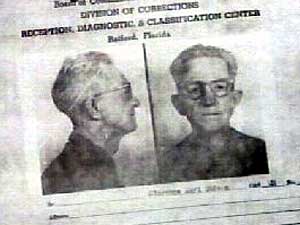|
Photos
More from MPR
Resources
Your Voice
|
Attorneys remember man who changed legal landscape for the poor
October 24, 2003
 |
| Clarence Gideon (Photo courtesy of Florida Department of Corrections) |
Minneapolis, Minn. — Clarence Gideon, a man with an eighth grade education, lived on the streets of Panama City, Florida in 1961. In June of that year, police arrested him for breaking into a pool hall, stealing beer, wine, and change from a cigarette machine and a juke box.
When he appeared before the judge, Gideon asked for a lawyer. The judge refused. The jury found him guilty of breaking and entering, and the judge sentenced him to five years in prison.
But Gideon didn't give up. In a handwritten letter filled with grammatical and spelling mistakes, he asked the U.S. Supreme Court to hear his appeal.
 | |||
At a ceremony at the Hennepin County Government Center, Chief Public Defender Len Castro read part of Gideon's letter to the high court.
"It makes no difference how old I am or what color I am or what church I belong to, if any. The question is, did I get a fair trial?" said Castro in quoting Gideon.
Two Minnesota legal heavyweights heard about Gideon and went to work on his behalf -- former University of Minnesota law professor Yale Kamisar, and Walter Mondale, then Minnesota's attorney general.
Kamisar was doing a study at the time in which he theorized that while there was no official requirement to provide lawyers for the poor, states still found ways to provide them. Kamisar was shocked to learn six states in the Deep South, including Florida, provided no lawyers. And, the Florida attorney general wanted to keep it that way, by arguing against Gideon's appeal. What's more, Florida's attorney general was trying to enlist the support of other attorneys general and legal scholars, including Yale Kamisar.
"I bumped into Fritz Mondale at some lawyer gathering and said, 'Would you believe this?' And he said, 'I got one too,'" Kamisar recalls. "And I said, 'What you ought to do is write back. And not only are we not going to join Florida, we're going to write a brief saying we ought to require lawyers in non-capital cases, if people can't afford to hire their own.'"
 | |||
"Sure. I'll do that," was Mondale's response.
Mondale says he linked up with Massachusetts' attorney general and they solicited other attorneys general against Florida.
"Surprisingly, we got 23 states to come down on Gideon's side," Mondale says. "One of the judges was later quoted that the court was stunned to see so many states represented on the defendant's side."
After the U.S. Supreme Court rendered its landmark ruling, prosecutors retried Clarence Gideon. This time he was defended by counsel. The jury found him not guilty and set him free.
Gideon's case forever changed the legal playing field for America's poor. But public defenders in Minnesota say the state no longer lives up to its history, or its obligation. Public defenders say they're crumbling under mounting caseloads and budget cuts. They say they can no longer provide the kind of defense the Gideon case envisioned.
At the end of Thursday's celebration, Federal Judge Michael Davis, a former Hennepin County public defender, remembered chief public defender Bill Kennedy who died last August. He said Kennedy would have been pounding his fist on the podium, demanding to know the point of the celebration.
"The public defender's office here is overworked and underpaid and underappreciated. I can see Bill standing here quoting Bobby Kennedy, when Bobby said the poor man charged with a crime has no lobby," Davis said.
The state Supreme Court has taken the public defenders' requests for emergency relief under advisement, and could rule at any time.
|
News Headlines
|
Related Subjects
|
